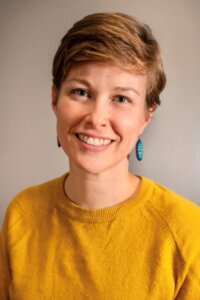by Dr. Caitlin Blewett, Thriving Project, RCCbc

Residency is hard. Anyone who has been through one has at least some memories of the burden of work, the burnout, the loss of empathy. We are probably all aware of the multitude of studies that have come out over the years documenting the decline in empathy of medical learners through medical school and especially through residency. Residents hit their programs with a solid baseline of burnout and continue down that slippery path for another two to five years —some even at six, seven or eight— and arrive at the beginning of their clinical careers with very little left in the tank.
So why bring this up? Why bring this into the conversation when health care is in crisis, the traumatic and horrific things are happening all over the globe, the Earth is warming, and climates are changing? Because I believe something different is happening to our medical learners. The burnout and loss of empathy I see in my resident colleagues is not the same as what my newer-to-practice preceptors talk about experiencing.
Most of the current crop of R2’s started their clinical learning in the first year of COVID. It was August of 2020 when I crossed the threshold of my small community hospital and started my clerkship. During that year, I never saw a preceptor’s face without a mask on. I never grabbed a coffee with my attending to have a hallway chat about their job, what they loved and what made the days seem long. The physicians I worked with were struggling to cope with all the things that COVID brought to the health care system and my presence, though welcome, was difficult to fit into the world they were navigating.
For those of us finishing a Family Medicine residency in 2024, our entire clinical careers have been lived during this global pandemic, the fallout of the “Freedom Convoy,” the escalating primary care crisis and the global context of life. This is our whole clinical picture. From speaking to my peers, to the learners just behind me and those who have just started their lives as staff physicians, I believe there is a different kind of burnout brewing in medical learners. We see you, preceptors we care for and respect, losing your connection to your work, frustrated, paring down your practices, pulling back behind allied lines to evaluate the damage and regroup.
We don’t mean to ask too much. We don’t want to be another burden on the plates and minds of our preceptors. We just ask that you remember this. That you take a moment to tell us about when medicine felt good, and that you have hopes or visions of when it will feel good again. We don’t know that world and sometimes we’re not sure it even exists.
Editor’s Note:
It’s difficult to read about the experience of Caitlin and her resident cohort during the COVID pandemic. Although the health care system is under significant stress, I believe many, if not most, rural practitioners also experience joy in at least parts of our work. Unfortunately, the pandemic and the current state of health care may be making it more difficult for learners to appreciate that. At the very least we can be mindful of this, and perhaps be more intentional about sharing our positive experience of work with learners. It’s also time for educators to consider formally addressing the need for learning around experiencing joy in medicine. – Tandi Wilkinson
 About Dr. Caitlin Blewett
About Dr. Caitlin Blewett
Dr. Caitlin Blewett is a Family Medicine resident on Vancouver Island. She has just joined the wonderful team at the Thriving Project at RCCbc, and also sits on the Scientific Committee for the BC Rural Health Conference.
Take part in the The Art of Thriving: a reflective writing series
Dates: Thursday, November 9, 16 and 23 from 7:00-8:15 pm. All sessions will occur on Zoom.
There is no expectation to attend all sessions – come to those work in your calendar.
Who can attend: Health practitioners (Doctor, resident, nurse practitioner, midwife) serving a rural community in BC
Cost: Free
Description: Integrating small writing practices into our everyday can allow us to slow down, reflect and develop more awareness about ourselves and our world. Through guided writing activities including list-making, visual journaling, and letter writing, participants will play with different ways to deepen their mindfulness and come away with tools to support their work as health care professionals.
Register: Fill out the registration form to participate and we’ll send you a calendar invite and reminders of the session dates.

Rayya Liebich is an award-winning Canadian writer and educator of Lebanese and Polish descent. Passionate about writing as a tool for transformation and changing the discourse on grief, she teaches creative writing classes to youth, and adults. www.rayyaliebich.com
Comments from past participants (Kootenay Boundary physicians)
- “That was a lovely exercise, I Think connecting with our creative and contemplative selves as a group is very sustaining and just the kind of thing we need.”
- “This was a really nice and uncomplicated way to help. personally i thought it went very far in my reminding me how to stay grounded without requiring an enormous amount of time.”
- “loved it. Rayya was lovely. She was calm and the exercises simple; however the effects were moving. Thank you”
- “Rayya was a wonderful facilitator who was able to promote deep introspection in a short time. She also has the gift of asking us to put our insights into practice.”